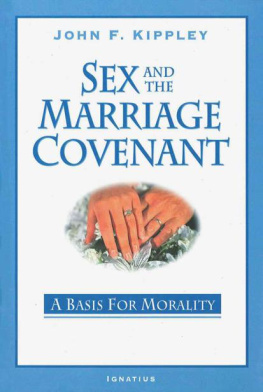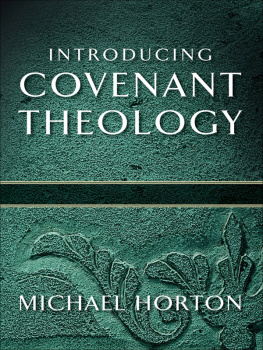Bradley G. Green - Covenant and Commandment: Works, Obedience and Faithfulness in the Christian Life
Here you can read online Bradley G. Green - Covenant and Commandment: Works, Obedience and Faithfulness in the Christian Life full text of the book (entire story) in english for free. Download pdf and epub, get meaning, cover and reviews about this ebook. year: 2014, publisher: InterVarsity Press / IVP Academic, genre: Religion. Description of the work, (preface) as well as reviews are available. Best literature library LitArk.com created for fans of good reading and offers a wide selection of genres:
Romance novel
Science fiction
Adventure
Detective
Science
History
Home and family
Prose
Art
Politics
Computer
Non-fiction
Religion
Business
Children
Humor
Choose a favorite category and find really read worthwhile books. Enjoy immersion in the world of imagination, feel the emotions of the characters or learn something new for yourself, make an fascinating discovery.

- Book:Covenant and Commandment: Works, Obedience and Faithfulness in the Christian Life
- Author:
- Publisher:InterVarsity Press / IVP Academic
- Genre:
- Year:2014
- Rating:4 / 5
- Favourites:Add to favourites
- Your mark:
- 80
- 1
- 2
- 3
- 4
- 5
Covenant and Commandment: Works, Obedience and Faithfulness in the Christian Life: summary, description and annotation
We offer to read an annotation, description, summary or preface (depends on what the author of the book "Covenant and Commandment: Works, Obedience and Faithfulness in the Christian Life" wrote himself). If you haven't found the necessary information about the book — write in the comments, we will try to find it.
Bradley G. Green: author's other books
Who wrote Covenant and Commandment: Works, Obedience and Faithfulness in the Christian Life? Find out the surname, the name of the author of the book and a list of all author's works by series.
Covenant and Commandment: Works, Obedience and Faithfulness in the Christian Life — read online for free the complete book (whole text) full work
Below is the text of the book, divided by pages. System saving the place of the last page read, allows you to conveniently read the book "Covenant and Commandment: Works, Obedience and Faithfulness in the Christian Life" online for free, without having to search again every time where you left off. Put a bookmark, and you can go to the page where you finished reading at any time.
Font size:
Interval:
Bookmark:
Berkouwer 1952: 17.
I am indebted to David Peterson and his excellent work Possessed by God: A New Testament Theology of Sanctification and Holiness (1995). He argues persuasively that NT teaching on sanctification emphasizes what is sometimes called definitive, or positional, sanctification. While I agree that definitive or positional sanctification is often in mind when the NT deals with sanctification, I argue that a real and transformative change occurs in the new covenant believer. The believer demonstrates actual obedience. This real obedience is rooted in and flows from definitive sanctification.
Owen 1965, 3: 370.
Ryle 2002: 132.
Luther 1962: 88.
Ibid.
Ibid. 89. Luther elsewhere writes, If we believe in Christ, we are considered absolutely just for His sake, in faith. Later, after the death of His flesh, in the other life, we shall attain perfect righteousness and have within us the absolute righteousness which we now have only by imputation through the merit of Christ (quoted in Piper 2002: 13). Luther says that after physical death, believers obtain absolute righteousness. He does not clarify whether there is any real and meaningful and necessary obedience in the life of the believer whose sins have been imputed to Christ, and to whom Christs perfect righteousness has been imputed.
Turretin (1997, 2: 702705) asks the question, in his Institutes of Elenctic Theology , Are good works necessary for salvation? His answer: we affirm. They are not required in a meritorious sense, but are nonetheless necessary for salvation. Turretin writes, Are they required as the means and way for possessing salvation? This we hold (702). Indeed, Although the proposition concerning the necessity of good works to salvation can certainly be misunderstood and misapplied, it can be retained without danger if properly explained (702703). Again, although works may be said to contribute nothing to the acquisition of salvation, still they should be considered necessary to the obtainment of it, so that no one can be saved without them.... Turretin is clear: Although God by his special grace wishes these duties of man to be his blessings (which he carries out in them), still the believer does not cease to be bound to observe it, if he wishes to be a partaker of the blessings of the covenant (703). For Turretin, Christ frees us to obey him: Christ, by freeing us from the curse and rigor of the law, still did not free us from the obligation to obedience, which is indispensable from the creature. Grace demands the same thing (704). Works are necessary to the obtaining of glory, For since good works have the relation of the means to the end (Jn. 3:5, 16; Matt. 5:8); of the way to the goal (Eph. 2:10; Phil. 3:14); of the sowing to the harvest (Gal. 6:7, 8); of the first fruits to the mass (Rom. 8:23); of labor to the reward (Matt. 20:1); of the contest to the crown (2 Tim. 2:4; 4:8), everyone sees that there is the highest and an indispensable necessity of good works for obtaining glory. It is so great that it cannot be reached without them (Heb. 12:14; Rev. 21:27) (705).
Luther, in public disputation with C. Cruciger, 1 June 1537; quoted in Rainbow 2005: 38.
Calvin 1960: 3.3.1 (593); 3.6.3 (687); 3.16.1 (798); cf. 2.7.13 (361362); 3.19.9 (840842); 4.14.23 (12991300). All references from Rainbow 2005: 38.
In particular, the issue of a future judgment and the future aspect or component of justification will be treated in chapter 6.
Aune, commenting on the link between keeping the commandments and holding the testimony: This is in essence a definition of Christian faith, in which the traditional commands of God, understood from a Christian perspective, are seen as complementary rather than antithetical to the requirements of faith in (or faithfulness to) Jesus (1998: 709).
Bruce, commenting on Heb. 3:6: The conditional sentences of this epistle are worthy of special attention (1997: 94). Chrysostom, Theodoret of Cyrus and Theodore of Mopsuestia, each commenting on Heb. 3:14, make reference in slightly different ways to union with Christ. According to Chrysostom, Christians have been made to share in being (with the Son). Theodoret of Cyrus sees Christians as joined to Christ the Lord. Theodore of Mopsuestia speaks of how Christians have become partakers in Christs hypostasis in that they have received a certain natural communion with him (quoted in Heen and Krey 2005: 57). The reality of union with Christ, or our unbreakable relationship with the Son, will feature significantly in the central thesis of my argument.
Regarding Johns phrase the one who conquers, Caird says that the Conqueror is one who perseveres to the end in doing the will of Christ (ii. 26), whose victory is analogous to the victory of Christ (iii. 21)... (1966: 33). Similarly, Mounce writes that these conquerors (Mounce: overcomers) are those who have remained faithful to Christ to the very end. The victory they achieve is analogous to the victory of Christ on the cross (1977: 72).
Whether they were eating of the tree of life before the fall is a separate question, dealt with below.
Ladd 1972: 4041. Cf. his footnote 21.
Bauckham 1993: 212. Although Bauckham is making a somewhat different point, and does not speak of union with Christ, what I am arguing is not altogether different from his thesis. Following M. Black, he suggests that Revelation might be considered a type of War Scroll of Christianity. While Black emphasized Christs role as the warrior, engaging in holy war with the sword of his mouth, Bauckham wishes to emphasize human participation in this holy war. I would agree that the message of the conquering texts suggests that Christians themselves are to conquer. Everything hinges on how we link the conquering of Christians to the conquering of their Lord.
Morris 1992: 111. While what Morris says is undoubtedly true, I wonder if he gets to the heart of the matter.
Hagner 1993: 109.
Carson 1984: 147.
Lloyd-Jones 1973: 303.
J. Murray, on Rom. 8:4: It is by the indwelling and direction of the Holy Spirit that the ordinance of the law comes to its fulfillment in the believer, and by the operations of grace there is no antinomy between the law as demanding and the Holy Spirit as energizing the law is Spiritual (7:14) (1959: 284). Cf. Rosner 2013: 121124.
Cf. Schreiner 1998; Stuhlmacher 1994.
Augustine 1991: 202.
Barclay 2006: 140157.
E.g. Packer 2003.
See Schreiner 1993a.
Schreiner 2001: 470.
Moo 2007.
Rosner 2013 (his book takes this verse as its subtitle).
These five general positions as Schreiner (1993b: 975976) lists them:
(1) Nomistic Service : identified with scholars such as E. Lohmeyer, where the emphasis is on the religious context in which the Law is kept. J. B. Tyson emphasizes the condition of life under Torah, particularly the demand to observe food laws and to be circumcised. Here, the reason the works of the law are criticized is not because such works are too difficult, but because with the coming of Christ in the new covenant, we live in a different era in which such JewGentile distinctions are no longer valid.
(2) Jewish Nationalism : J. D. G. Dunn sees the works of the law as identity markers, such as circumcision, food laws, and Sabbath-keeping for these separated Jews and Gentiles. The problem was with Jewish nationalism and particularism, not with legalism or activism (emphases original).
(3) Legalism : D. Fuller contends that Paul does not argue that no one can obey the law, for the law is a law of faith. Pauls polemic is against a distortion of the law, not against the law itself.
(4) Subjective Genitive : L. Gaston suggests that works of the law is a subjective genitive, and hence denotes works which the law does. What the law does ultimately is to produce sin and unrighteousness, which cannot justify someone.
Font size:
Interval:
Bookmark:
Similar books «Covenant and Commandment: Works, Obedience and Faithfulness in the Christian Life»
Look at similar books to Covenant and Commandment: Works, Obedience and Faithfulness in the Christian Life. We have selected literature similar in name and meaning in the hope of providing readers with more options to find new, interesting, not yet read works.
Discussion, reviews of the book Covenant and Commandment: Works, Obedience and Faithfulness in the Christian Life and just readers' own opinions. Leave your comments, write what you think about the work, its meaning or the main characters. Specify what exactly you liked and what you didn't like, and why you think so.








